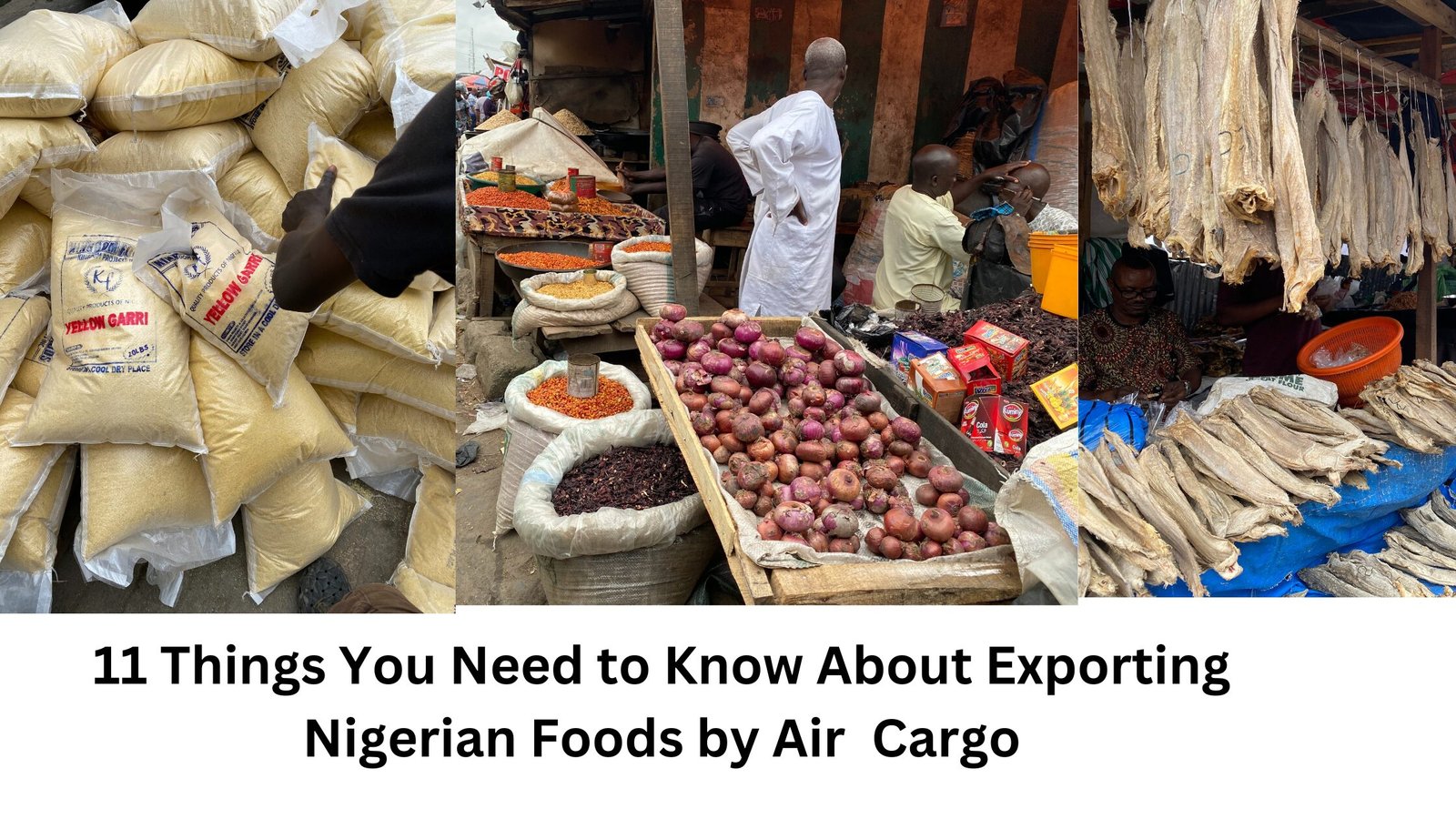11 Things You Need to Know About Exporting Nigerian Foods by Air Cargo.

11 Things You Need to Know About Exporting Nigerian Foods by Air Cargo
Table of Contents
- Introduction to 11 Things You Need to Know About Exporting Nigerian Foods by Air Cargo
- Exporting foods that are illegal
- Exporting Snails
- Roles of a Forwarding Agent
- Packaging Palm Oil
- Shipping Live Snails
- Packing Fresh Locust Beans
- Shipping Frozen Snails
- Import Limitations on Nigerian Leaves and Herbs
- Keeping Track of Customs Regulations
- Starting a Food Export Business (Templates)
- Packing Dry Fish for Export
- Conclusion on 11 Things You Need to Know About Exporting Nigerian Foods by Air Cargo
Introduction on 11 Things You Need to Know About Exporting Nigerian Foods by Air Cargo
11 Things You Need to Know About Exporting Nigerian Foods by Air CargoWhether you are about to start or have a Nigerian food business outside Nigeria, knowing about the logistics of exporting Nigerian foods is important. This guide details eleven things you must know about exporting Nigerian foods by air cargo which will allow you to successfully navigate regulations, packaging and best practices.
Food Items Prohibited From Exporting:11 Things You Need to Know About Exporting Nigerian Foods by Air Cargo
Beef, beans and fresh locust beans (iru) are samplings of Nigerian foods that may not be shipped out of Nigeria, many are however either prohibited or require clearance for export, all for the purpose of protecting the health and well-being of the local population.
Exporting Snails: 11 Things You Need to Know About Exporting Nigerian Foods by Air Cargo
You may export live, frozen and oven-dried snails to a wide range of countries including Great Britain, United States and Canada. Exporters who are dealing with these products will generate a good profit due to high demand.
Important Functions of a Forwarding Agent: 11 Things You Need to Know About Exporting Nigerian Foods by Air Cargo
The forwarding agent you choose is fundamental for the success of your export process. They should:
Give recent insights into customs regulations for the foods by Nigeria you plan to ship.
Be able to call upon a trusted clearing agent who has all the right permits and licenses to collect the goods from customs in the destination country.
Provide a straightforward shipping cost breakdown without unexpected fees popping up during the process
Packaging Palm Oil: 11 Things You Need to Know About Exporting Nigerian Foods by Air Cargo
According to a report in The Sun, palm oil is packed in wooden crates for air cargo transport. This way the oil is safe & meet transporting rules.
Shipping Live Snails: 11 Things You Need to Know About Exporting Nigerian Foods by Air Cargo
In the air cargo industry, live snails are usually packed in wooden crates. Each crate can carry around 200 jumbo-sized snails, weighing about 250 kg in total.
Packing Fresh Locust Beans
Bulk packed fresh locust beans can be packed in plastic buckets and wrapped tightly in shrink wrap. The same goes for clearing agents at the destination as they must have permits and licenses in order to receive these items from customs.
Shipping Frozen Snails
Dried snails are packaged in polystyrene boxes with ice cubes. This preserves the vitality of the snails during their journey, keeping them alive until they arrive in kitchens or other places for preparation.
Prohibition on Nigerian Leaves and Herbs
Currently, dry Nigerian leaves (E.g. ewedu, zobo leaves, ugu) and herbs can not be shipped using air cargo. Such limitations need to be known by exporters to avert penalties or loss of goods.
Keeping Track of Changes in Custom Laws
Custom regulations are different from one country to another and may change at any time. Especially if you are shipping products in bulk, it is essential to know the most up-to-date requirements before you prepare for shipping to avoid trouble in customs.
Nigerian Food Products for Export: In Conclusion
For branded Nigerian food products, it is important that the same ingredient list and manufacturer details which needs to be displayed in Food Regulatory agencies in the country they are shipped to are labelled accordingly. Doing so helps ensure compliance and expedites the process through customs.
Packing Dry Fish for Export
Generally, dry fish are packed for air cargo in vacuum-packing bags, like Ziploc bags. These airtight packs keep them fresh longer. Most importantly, when fish is dried using an oven, it is slow-cooked, allowing for all the fish to cook and dry so that it avoids burning. This not only prolongs the shelf life of the fish but also reinforces its flavor.
Conclusion 11 Things You Need to Know About Exporting Nigerian Foods by Air Cargo
Exporting Nigerian foods through air cargo can be a very lucrative venture if well thought out and put into practice. These eleven hints will support you through your adventure and step you through the way to rent the export process: From understanding the most effective way to comply with regulatory requirements, to mastering packaging techniques. Store this checklist in your mind the next time you ship Nigerian foods abroad and enjoy a smooth experience for you and your customers. click here to order
